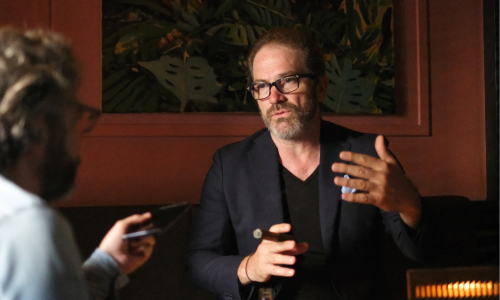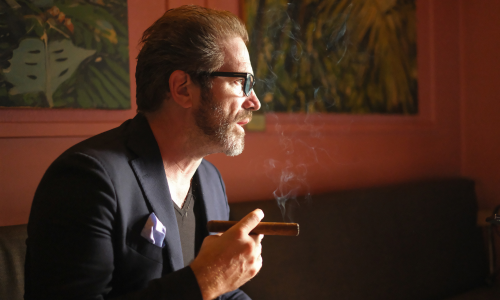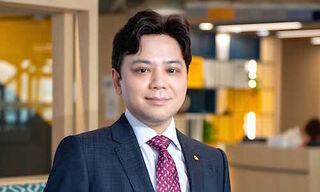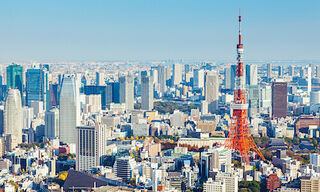A Career in Cigar Passion and a Private Banker Wife
How are new cigar blends crafted? Didier Houvenaghel, the Singapore-based expert and creator of boutique brands such as «Nicarao,» «Furia,» and «La Ley,» speaks to finews.asia. He also shares insights into why the dominance of Cuban brands might be waning.
Wherever Didier Houvenaghel makes an appearance, he invariably draws significant attention from cigar connoisseurs. Such was the case last Wednesday when he conducted a masterclass on cigar aging at «Manuel’s,» a well-known cigar spot in Zurich, hosted by owner Manuel Fröhlich.
Houvenaghel carries an impressive reputation: He is one of the very few Europeans to have studied agronomy at the University of Pinar del Rio in the early 2000s. This university is situated in the region where the tobacco for Cuban premium brands like «Cohiba», «Montecristo», and «Partagas» is cultivated.
Author of a Seminal Work
Houvenaghel is also the author of the definitive book «The Cigar. From Soil to Soul,» which addresses all pertinent topics of cigar science across 318 pages and 11 chapters.
In collaboration with Nicaraguan producer A.J. Fernández, Houvenaghel has developed four highly regarded boutique brands: «Nicarao,» «Furia,» «La Preferida,» and «La Ley.» Claude Guggenheim, who imports Houvenaghel’s cigars to Switzerland through his «Compania de Tabacos,» also attended the masterclass.
Five Tobacco Leaves from Five Countries
When asked to describe his profession, Houvenaghel spontaneously says, «Cigar Passionate.» His role is akin to that of a cellar master in the champagne or spirits industry: He evaluates which tobaccos are available in what quality, with which aromatic and physical (burning) properties.
He then creates a blend, typically from five different leaves, often mixing leaves from various regions and countries. «It is not uncommon for us to roll five leaves from four or even five different countries together.»
Comparable to Cognac and Champagne
Unlike wine, cigars made from a single tobacco vintage are exceedingly rare, Houvenaghel explains. Consequently, creating cigars is similar to producing champagne or cognac, where blends from different years are utilized.
To illustrate this, he showcased his «La Ley Reserva 2016.» The age designation 2016 does not signify that only tobaccos from that year were used. «It is the time when I finalized the blend from the tobaccos available then.»
Aging Brings Finesse
Tobaccos, Houvenaghel explains, vary significantly in flavor depending on the variety, growing region, and processing. Before they can be rolled into a cigar, the leaves undergo fermentation and aging. «They can be rolled at the earliest after 15 months.» Or even years later. «The longer the tobacco ages, the more finesse it develops, until a limit.»
Even after rolling, the cigar continues to age and evolve in taste. «However, much, much slower than during the initial aging in heavy leaf bundles.» Like wine, each cigar has a typical aging curve. Some reach their peak only after five or ten years, while others are best smoked straight off the shelf.
The Cuban Question
We asked Didier Houvenaghel why, after studying in Cuba, he did not remain loyal to the Cuban cigar industry. After all, Cubans and a significant part of the cigar community believe that Cuban tobacco is unique and the best in the world.
It is indeed unique, Houvenaghel replies. «The soil in the Pinar del Rio region is perfect for cigars. Tobaccos from there have unique, characteristic properties. Just like a Pinot Noir from Burgundy differs from a Pinot Noir from Switzerland or Germany.»
However, Havana cigars owe their worldwide fame partly to the fact that they were virtually alone on the global market for centuries. Even during colonial times, Cuba established itself as the most important export country for cigars due to reliable production in large quantities. «This, although tobacco was probably grown earlier in the Dominican Republic.»
A «Snobbish Background»
Since the Cuban revolution of 1959, and especially since the 1980s, other countries have caught up: the Dominican Republic, Nicaragua, Honduras.
«I can’t relate to the saying that one only smokes Havanas if it has a nationalistic or snobbish background,» says Didier Houvenaghel. Among the best cigars he has smoked in his life, quite a few came from Cuba, but also from other countries. «If someone has tried everything and then concludes that Cuban cigars are the best, then I think it’s okay.»

«The longer the tobacco ages, the more finesse it develops.» (Image: Manuel's)
In his conviction, Cuban cigars will not maintain their dominant position in the premium segment in various regions: «Fifty years ago, it was said that one could only drink French wines and being an expert. Today, such a statement would be laughed at. In the meantime, other countries have come to the world market with fantastic products and many tasters have developed more curiosity. With cigars, we are lagging behind this development, but it is coming.»
The Decision to Write a Book
After completing his agronomy studies in Cuba, the native Belgian returned to Europe and worked for the European Commission for a while. But the cigar theme wouldn’t leave him alone. During his studies, he had become too unfamiliar with the actual end product.
He searched for professional literature and quickly realized that there was little useful material available. So, he decided to write his own book. During his research trips to the important production countries in the Caribbean, he created his own brand «Nicarao» in 2001.
Later, he met producer A.J. Fernández, with whom he has been working exclusively since 2006. «We are very, very different types. And besides friendship, we share a passion for cigars and a high standard of quality. In this respect, neither of us tolerates the slightest deviation.»
Seventeen Years in Singapore
Didier Houvenaghel has lived in Singapore for 17 years, where his cigars are distributed by an importer. His wife has been working in private banking for Swiss institutions in the city-state for a long time.
What is life like as a professional «Cigar Passionate» in Singapore with its strict anti-smoking laws? There is hardly any space for cigar enjoyment in public, «but if you know the country, there are definitely options.» The weather is usually very friendly, so one can smoke outdoors, and some private cigar lounges have also been established.




















